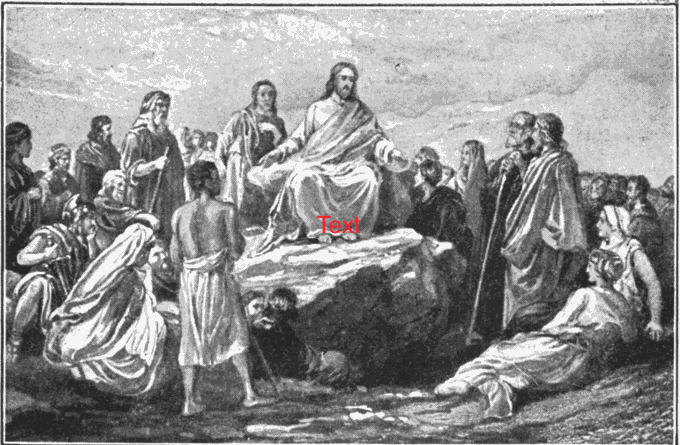Sermon on the Mount: Single Sermon or Random Topics?
by G.S. Augustine

The Holy Spirit Inspired Both Text and Structure
Many modern interpreters see the Sermon on the Mount as just a collection of Jesus teachings without much connection between the various parts. Although we must acknowledge, looking at Luke’s Gospel, that Jesus did teach many of these things in several places (several times?), we must also acknowledge that Matthew under the direction of the Holy Spirit organized the material as we have it. I believe God inspired the text we have and its structure so that it is not accidental. We are supposed to take it into account
But how? When looking at the Sermon on the Mount, it is best first to take a birds eye view of the entire context and notice threads that tie it together. We are looking for clues that would naturally lead to logical conclusions. The next thing is to capture the foundational message behind each of the various sections. Lastly, we look to create a logical development from one subject to another. Biblical writers juxtaposed various events or teachings in order for us to see a flow of thought.
The Problem of Paper and Ink
This an other literary techniques save paper and ink that was far more difficult to obtain in ancient times. Our methods and styles of writing when paper and ink comes in barrels and reams make us ask why didn’t that explain it more clearly? But everything was done by hand including making the paper and creating the ink. Additionally, they wrote the documents out by hand. And to preserve the documents, scribes set about copying the material as paper wore out . And lastly, scribes and the educated of the time understood these techniques and were used to them and could follow them. We however have lost the art.
Though many exegetes balk at this approach, I believe Matthew under the guidance of the Holy Spirit organized Jesus teachings into a unified whole. It is true that at times we must be willing to make connections by linking words that are only synonymous rather than simply identically repeated, but this is not an unreasonable approach. Just as we do, Jesus used different words at different times to convey his thoughts about the same topics. And Matthew tying them together in tight juxtaposition bolsters the argument.
The Unifying Principle of God’s Law
The first thing we need to notice is the subject of “God’s Law” in Matthew 5-7. It is correct to think of the Law of Moses here but Jesus is going to provide a new way of looking at it—or actually the correct way of looking at it—as God always intended. In 5:17 Jesus says: “Do not think I have come to abolish the Law or the Prophets.” This is actually the beginning of the main section of the sermon. Verses 3-16 form the introduction to what the sermon will focus on, and we’ll look at that in a moment.
When we look over to Matthew 7:12, Jesus says there: “In everything then, do to others what you would have them do to you. For this sums up the Law and the Prophets.” This becomes the closing statement of the main body of the sermon. Everything between 5:17 and 7:12 needs to be in the context of understanding the implications of God’s law as he intended it to be understood from the beginning.
Matthew 5:13-29 forms the epilogue to the sermon or, to put it in a modern sense, the application and implications of the sermon as a whole. We will look at this in more detail below but it is good to notice the fact that in 7:23 Jesus identifies those who call him Lord but do not do the will of his father as “lawbreakers” or “workers of lawlessness.” Again this ties in with the whole subject of God’s Law.
Wait! We’re Not Under Law!
Now at this point, it is necessary deal with a complaint that many will make: “The law is no longer in effect. We are not under law but under grace! In saying this, most don’t discount Matthew 5-7 entirely. But when somebody thinks, “Well, I’m not perfect, I’m forgiven,” it’s a practical result. Jesus does say back in Matthew 5:20 “Unless your righteousness exceeds that of the Scribes and the Pharisees, you will never enter the Kingdom of Heaven.” We were unable to do it. So it’s natural for us to think “Jesus did it for us and God credited his faithfulness unto death to us.”
There is some truth to this theological conclusion. But we can’t take Jesus words too lightly here either. He also says, “Until heaven and earth pass away, not a single jot, not a stroke of a pen will disappear from the law …” (5:18). Clearly, Jesus intends for us to have this law in our hearts in order to live it out, and particularly in the way he describes.
So, How Do We Go About It?
So how is a Christian to understand the sermon? We begin with the introduction. Jesus speaks of those who participate as members of the kingdom of heaven as the poor in spirit, those who mourn, and the meek. He adds to that those who hunger and thirst for righteousness, the merciful, the pure in heart. And then finishes off with the peacemakers and those who the kingdom of darkness insults and persecutes because of the allegiance to God’s kindom.
Jesus is about to combine these qualities with the proper understanding of the law. The law was not about outward behaviors alone. The law identifies tangible ways in which love for God and neighbor behaves. In order to do this we will need those blessed qualities. We weren’t just to refrain from murder, we were to actively protect our neighbors life out of love. We weren’t just to refrain from adultery, but to actively protect our neighbor’s family. We weren’t just to refrain from bearing false witness. We were to protect our neighbor’s reputation. At times this can cost us. Only those with Jesus “beatitudes” of the Sermon will be able to live this way.
The Two Greatest Commandments
One aspect of the foundation of God’s law is “loving your neighbor as yourself.” Jesus is highlighting this idea throughout the sermon. The reason to avoid divorce is that it harms your family and likely someone else’s. We avoid oaths because an oath suggests that my “yes or no” to you is suspect without it and undermines necessary community confidence. We don’t get even (“an eye for an eye”) because it only increases the violence. Truly loving our neighbor (and Jesus will in another place describe a neighbor as anyone in need) absorbs the painful consequences of a fallen world.
In Chapter 6, Jesus then turns our attention to gaining favor with God by doing “righteous acts.” He addresses giving to the needy, praying and fasting.” In each of these cases he warns us not to do them to gain the praise of men. Here we are concerned with both our relationship to God and people. If I give, pray and fast simply to gain praise from people, I really do not have love for God in mind. I am to love God above all else. If I seek men’s praise in religious observance, I have placed that praise above God. Conversely, by “showing off” before people, I subtly see myself as better than them (and deserving of more privileges. Like the Pharisees!).
This is a significant issue when reading Paul. In Romans 2, Paul writes along the same lines about the Law. There he says that what it means to be a Circumcised Jew is a matter of the heart not a matter of the flesh, “by the Spirit, not by the written code. Such a person’s praise is not from people, but from God” (Romans 2:28). Paul is in total agreement with Jesus here.
Synonymous Connections: Reward and Treasure
After the discussion of righteous acts, Jesus then speaks about building treasures in heaven. In the first 18 verses of chapter six he refers to “your reward” which can either be the praises of men or the reward you get from God “who sees in secret.” The Greek word for “reward” is misthos. Then the sermon switches to speaking about “treasures” (Gr. thesauros). Because the words are different, one could conclude that there is no connection. But I believe this is a mistake. Though the words are different, the ideas are the same. A reward is something I seek by my actions. A treasure is something I seek to gain and store through my actions
If I am correct, then the focal point of building treasures on earth relates to living life for the praise of men and building treasures in heaven focuses on living life for the praise of God. The fact that Jesus uses the metaphor of an eye either full of light or darkness supports this conclusion. If the eye is focused on living for God’s praise, it is full of light, If the eye is focused on living for the praise of men, then it is full of darkness. And if a person is really living for the praise of men but thinks he’s living for the praise of God (such as the pharisees!), the darkness is overwhelming. He will also say, “You cannot serve both God and Money.” That suggests an attempt at divided loyalties. Seeking the praise of men in religious observance instead of God is a divided loyalty.
Things That Derail Us: Worry
Jesus then turns his attention to a few things that can derail our living for the praise of God: worry about how our basic needs as humans is the first. Worry can lead to taking short cuts our of fear and at the expense of my neighbor or at the expense of my allegiance to Christ. I need confidence in God’s love and his provision for his people. Obeying God can seem like you aren’t looking out for your own interests. What Jesus teaches here looks a lot like work without personal benefit. But Jesus points out how much God cares for birds and flowers which are significantly less valuable than humans. If God does that for birds and grass, how much more will he care for you! So Seek God’s kingdom and righteousness; he will supply the rest! You will benefit greatly from God’s faithfulness.
Things That Derail Us: Judging and Comparing
The second problem facing the believer in living out “God’s law of the heart” is our incessant desire to compare ourselves and control others. We judge and correct people from the incorrect belief that we are better than they are. The problem is, we all fail to live up to God’s law in one way or another and we all need grace. It is most often the person with the biggest log in his eye that seeks to take a speck out of his brothers. By not recognizing our own faults, our compassion for people evaporates. When I notice the log in my own eye and discover just how difficult is it to remove it, the more compassionate and gentle I will be in helping my brother.
But also it is not my job to change people. I am to give them what they need, not tell them what I think they should do. Jesus comment about not throwing pearls before swine or giving holy things to dogs is more about the fact that pearls and holy things will not feed them. Giving hungry folks something they can’t eat is a dangerous thing. Your job as a believer is to be a servant and seek to meet their actual needs, not turn them into your version of the proper human being.
But What About My Needs?
But then, the logical question comes up: “But what about my needs? How are they going to be met?” Jesus answer: Ask. Our first inclination is to turn our thoughts to “prayer.” And although Jesus gets to that, the text doesn’t allow us to stop there. Jesus says, in your interactions with people, “Ask, Seek, Knock.” God has designed people to be responsive to those actions. They are made in his image. You don’t have to steal or bully, just ask. You’ll be surprised at how powerful that is in our world. Asking receives, seeking finds, knocking opens doors. Maybe not all the time but quite often. Your needs are connected to the needs of the world around you. Make polite asking, seeking and knocking the way you operate within your community.
Jesus then turns our asking to God. God is always responsive. Jesus compares our praying with a son asking his father for bread or a fish. The father would never answer those requests by giving his son a stone or a snake—and we are evil! How could God, who is holy, ever do less than an earthly father? One might complain that I’m saying, “Ask people first. If that doesn’t work out, ask God.” Matthew doesn’t put a predicate on the asking, seeking, knocking. The idea is to ask, seek and knock as a matter of course. Yes, ask God but ask people as well. They are often going to be the means God uses to meet your needs.
Conclusion of the Matter
Jesus then concludes the sermon in 7:12 with the golden rule statement saying that doing to others what we would have them do for us fulfills the Law and the Prophets. Here is the summary statement to the whole sermon. What Jesus teaches is that we keep God’s Law when we truly love of God and people. It’s a heart issue.
Warning: Choose Jesus Narrow Teaching
The epilogue begins in 7:13 with a metaphor about a broad road that leads to destruction and a narrow one that leads to life. We are immediately tempted to jump to salvation through Christ and Christ alone. Though ultimately we can apply the passage to this, I don’t believe it is the immediate focus.
The narrow way that Jesus is referring to here is his narrow definition of the meaning of the law and the prophets. It’s not just what you do with your outward behavior but what you do with your heart. Taking God’s law to mean that you just need outwardly morality will not lead to life but ultimately will wreck your life. Outward behavior is easier and more self aggrandizing and many go that way. Genuine love for God and people is harder and fewer go that way. And to carry the metaphor to its ultimate conclusion: The path you choose in some ways also does determine whether or not you enter God’s kingdom (see Matthew 5:20 and below).
The Wide View Is Taught By False Prophets
Jesus then warns about listening to false prophets who attempts to convince you that the broad way is sufficient: “Hey you’re a good enough person.” They themselves are outwardly wearing sheep’s clothing, but inwardly they are ravenous wolves. Again the notion of outward appearance vs. inward reality is on display. He says look at the fruit of their lives. A good tree can’t bear bad fruit and vice versa. And Jesus warns that just because someone calls him Lord doesn’t mean much. And just because someone does Christian-like things doesn’t mean he keeps God’s law. A person can be a full blown law breaker and do them.
Hearing Wisely; Hearing Foolishly
Lastly Jesus concludes with a metaphor of building a house on a rock foundation or on sand. Jesus uses the phrase: “These words of mine,” which can only refer to his teaching about the law. Taking Jesus statements that the law means that I live my life out of love for God above all else and love for neighbor as myself will build that life on a solid foundation and the vicissitudes of life will not harm it. But should you build your life only outward morality to gain the approval of people and ignoring the praise of God you will be building your life on a sandy foundation that will not hold up to the storms that come. The ultimate spectacular fall of the house can metaphorically represent falling short of salvation.
Fitting the Sermon With Grace
So how does this relate to the Christian who is saved by grace? The bible clearly states that salvation does not come by the works of the law but by the shed blood of Jesus. Jesus lived the only perfect life, yes, but he also lived the only life in which he never broke his trust and allegiance to the Father even when facing the loss of everything.
Since he was never disconnected from the source of all life (that is God the Father), it was impossible for death to hold him (Acts 2:24). When I place my faith in Jesus, I die with him (Romans 6:4) in order to be raised with him. God the father credits my trust and allegiance to his son as if I did what Jesus did. That is, that even in the face of the loss of everything, God credits my trust in Jesus as if I maintained my allegiance to the Father. My dying with Jesus therefore places God the Father above all else in my life including my own life.
What Allegiance To Christ Looks Like
So what does dying to my own life and being raised to a new life look like? It looks like Jesus definition of the Law and the Prophets in the Sermon on the Mount. Failure to embrace Jesus teachings here is an indication that one has not died to their own life and their allegiance lies elsewhere. This is what Jesus means when he says:
Not everyone who says to Me, ‘Lord, Lord,’ will enter the kingdom of heaven, but only he who does the will of My Father in heaven. Many will say to Me on that day, ‘Lord, Lord, did we not prophesy in Your name, and in Your name drive out demons and perform many miracles?’
Then I will tell them plainly, ‘I never knew you; depart from Me, you workers of lawlessness!’ (Matthew 7:21-23)
Does this mean we must live perfect lives to qualify? No. Remember the log in my own eye? Jesus accounts for the fact that it is a process. Taking logs out of our own eyes and specks out of a brother’s is about lives that are moving toward being more like Christ. Even the Old Testament had provisions for failure. If the heart is humble enough to acknowledge where we failed and confess it (1 John 1:9), we are keeping the law as Jesus intended.






